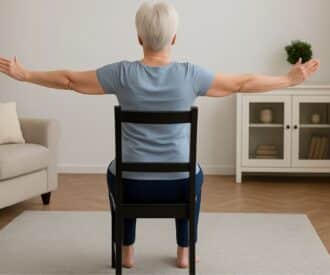
Sleep is essential for hard-working caregivers, but between regular life and caregiving responsibilities, getting enough quality rest can be a big challenge. Vive Health shares 6 smart tips to combat caregiver sleep deprivation. Find out how to make it easier to fall asleep and stay asleep as well as improve sleep quality.
Is lack of sleep making your caregiving duties more difficult?
It might seem like falling asleep quickly would be easy after a long day of caring for your older adult, running errands, cooking, wrangling doctor’s offices and insurance companies, and working, but that’s not always the case.
Unfortunately, stress, anxiety, and a never-ending “To-Do” list prevent many caregivers from getting the recommended 7 to 9 hours of quality sleep they really need.
Researchers continue to link sleep deprivation to an increased risk of numerous conditions including depression, heart disease, high blood pressure, diabetes, mood disturbances, and even Alzheimer’s disease or dementia.
If you’re suffering from caregiver sleep deprivation and struggle with falling asleep at night, staying asleep, or getting quality sleep, don’t miss these 6 smart tips.
1. Modify your sleeping environment
There are a few simple steps you can take to make your bedroom a more conducive environment for quality sleep.
One tip is to limit light exposure. Close the blinds, turn off all lights inside and outside the bedroom, and consider an eye mask.
Experts have also found that cooler temperatures encourage better quality sleep. When possible, adjust your bedroom temperature to between 60°F and 67°F.
Limiting noise can also help quiet the brain for slumber. Avoid falling asleep with the TV on and play soft music or white noise on your smartphone to drown out any noise outside.
A weighted blanket can also improve quality of sleep. They reduce anxiety, calm nerves, provide comfort, and promote deep sleep.
2. Prep for appointments
Every caregiver has been there. Lying in bed awake, unable to fall asleep as item after item gets added to your mental To Do list for an appointment the following day.
Whether you’re taking your older adult to the doctor, to a specialist, or simply to get a quick screening or test, chances are there are a handful of things you need to coordinate ahead of time.
This might include packing snacks, water, medicine, making sure you have their ID and insurance card ready, and making a list of questions and concerns for the doctor.
Avoid this late night anxiety and instead, take the time to prep everything the day before an appointment.
This also gives you more time to remember something you might have forgotten.
3. Look into remote monitoring
If the stress of worrying about your older adult is causing you to get up and check on them throughout the night, you might benefit from remote monitoring technology.
Remote monitoring devices can be set up in your older adult’s room, allowing you to check on them without having to get out of bed.
For example, many digital baby monitors allow you to listen to someone in another room and even watch them on video.
4. Avoid blue light
Research says that blue light has got to go when it comes to getting a good night’s sleep.
Blue light from digital devices like smartphones, tablets, and even TVs actually trigger the brain to suppress melatonin production (the hormone that cues your body that it is time to sleep).
To minimize blue light exposure, set your smartphone to a night shift mode so it emits warmer light around bedtime.
Or try to avoid digital devices in the hour or two leading up to bedtime.
To regulate your natural circadian rhythm, it is critical to get real sun exposure throughout the day. Open the curtains in the morning and take brief breaks to step outside during the day.
If your area doesn't get much sunlight, consider using an inexpensive light therapy lamp to get needed daytime light exposure.
5. Eat for sleep
If caffeine and sugar are your go-to agents for getting through each evening as a caregiver, you are not doing your brain or body any good when it comes time for bed.
Instead, eat foods with nutrients that naturally induce sleep with high levels of melatonin.
That includes tart cherry juice, almonds, and walnuts. Other foods that aid quality sleep and fight insomnia include chamomile tea, turkey, banana, kiwi, and fatty fish.
6. Exercise
One sure-fire way to help you fall asleep and stay asleep throughout the night is to wear your body out with exercise.
Caregiving duties often feel exhausting, but they’re not the same as committing to a set period of physical fitness like taking a brisk walk or exercising with resistance bands in the house.
You can also work more physical activity into your day by taking stairs instead of elevators, doing bodyweight exercises like squats and lunges while you cook, and walking around (instead of sitting) while you’re on the phone.
Recommended for you:
- 2 Ways to Solve Senior Sleep Problems for Better Rest
- 11 Tips to Improve Senior Sleep by Reducing Pain and Discomfort
- Weighted Blankets for Dementia Improve Sleep and Reduce Anxiety
Guest contributor: Jessica Hegg is the content manager at ViveHealth.com. Interested in all things related to living healthy lifestyle, she works to share valuable information aimed at overcoming obstacles and improving the quality of life for others.
This article wasn't sponsored, but does contain some affiliate links. We never link to products or services for the sole purpose of making a commission. Recommendations are based on our honest opinions. For more information, see How We Make Money.
About the Author
Jessica Hegg
Jessica Hegg is a manager at ViveHealth.com. Ms. Hegg was also a full-time caregiver for her Mom who had Primary Progressive MS and Epilepsy. She is a freelance writer with a passion for cooking and lives in Austin, TX with her Mom and her wonderful husband. You can find her personal blog about caregiving tips, ideas, and solutions at Givea.Care.




